Where to find Africa’s best safari guides
Even among African safari guides, Zimbabwean guides are considered the best on the continent. Of course, all safari guides are well-trained and knowledgeable, but Zimbabwe’s training to be a “Pro Guide,” is the most demanding and extensive on the continent. Typically, the licensing process and education takes about four years to complete! So, anyone interested in safari guiding needs to be determined and passionate. The requirements and examinations are created and administered by the Zimbabwe National Parks and Wildlife Management Authority in collaboration with Zimbabwe Professional Hunters and Guides Association.
 In order to become a Zimbabwe guide, students must pass a lengthy written exam covering a variety of topics related to flora and fauna. Prospective guides often study for a year before taking the test. If they pass, they go on to an apprenticeship with companies such as Wilderness Safaris (with whom my company partners). They will spend three years as a trainee under the tutelage of a professional walking guide. In addition, trainees must meet several milestones in order for their mentor to sign off on their training.
In order to become a Zimbabwe guide, students must pass a lengthy written exam covering a variety of topics related to flora and fauna. Prospective guides often study for a year before taking the test. If they pass, they go on to an apprenticeship with companies such as Wilderness Safaris (with whom my company partners). They will spend three years as a trainee under the tutelage of a professional walking guide. In addition, trainees must meet several milestones in order for their mentor to sign off on their training.
 After three years of hands-on, experiential training, there’s a panel interview. Trainees are questioned on their breadth of knowledge, experience in the bush, and safety procedures. They must also display practical skills such as a firearms proficiency exam. , as well. While most guides will not be involved with hunting safaris, guides are required to carry rifles at all times on game drives and bush walks for photographic safaris.
After three years of hands-on, experiential training, there’s a panel interview. Trainees are questioned on their breadth of knowledge, experience in the bush, and safety procedures. They must also display practical skills such as a firearms proficiency exam. , as well. While most guides will not be involved with hunting safaris, guides are required to carry rifles at all times on game drives and bush walks for photographic safaris.
 After all of that, the ultimate test is still yet to come—a seven-day “mock” safari. For this final examination, the trainee guide sets up and runs their own tented camp safari with “guests” from the national parks and guide organization. They judge on a range or criteria including hosting, safety, knowledge of wildlife and botany, and bushcraft. If the mock safari is successful, the trainee becomes a fully-licensed Zimbabwe safari guide!
After all of that, the ultimate test is still yet to come—a seven-day “mock” safari. For this final examination, the trainee guide sets up and runs their own tented camp safari with “guests” from the national parks and guide organization. They judge on a range or criteria including hosting, safety, knowledge of wildlife and botany, and bushcraft. If the mock safari is successful, the trainee becomes a fully-licensed Zimbabwe safari guide!
 Keep in mind, that although a guide may be trained by the book, there is a lot more to being a great guide. High-end camps and lodges also require certain personality traits, such as having a guest-centric attitude, patience, and an innate understanding for dangerous animal behavior. Being a people person is incredibly important, as is having an appreciation for lighting and vehicle positioning for photography. As a guest, you may not even realize the thought that goes into details like that. It’s also vital for guides to be good storytellers. During game drives and at sundowners, guides will regale guests with stories about funny animals, incredible moments, and their own background. A vivid and animated storyteller is much more memorable and entertaining than a dull one!
Keep in mind, that although a guide may be trained by the book, there is a lot more to being a great guide. High-end camps and lodges also require certain personality traits, such as having a guest-centric attitude, patience, and an innate understanding for dangerous animal behavior. Being a people person is incredibly important, as is having an appreciation for lighting and vehicle positioning for photography. As a guest, you may not even realize the thought that goes into details like that. It’s also vital for guides to be good storytellers. During game drives and at sundowners, guides will regale guests with stories about funny animals, incredible moments, and their own background. A vivid and animated storyteller is much more memorable and entertaining than a dull one!
 Matt Holmes is the Founder & President of Boundless Journeys. Boundless Journeys is an award-winning tour operator that goes off the beaten path for immersive and authentic travel experiences.
If you would like to be a guest blogger on A Luxury Travel Blog in order to raise your profile, please contact us.
Matt Holmes is the Founder & President of Boundless Journeys. Boundless Journeys is an award-winning tour operator that goes off the beaten path for immersive and authentic travel experiences.
If you would like to be a guest blogger on A Luxury Travel Blog in order to raise your profile, please contact us.
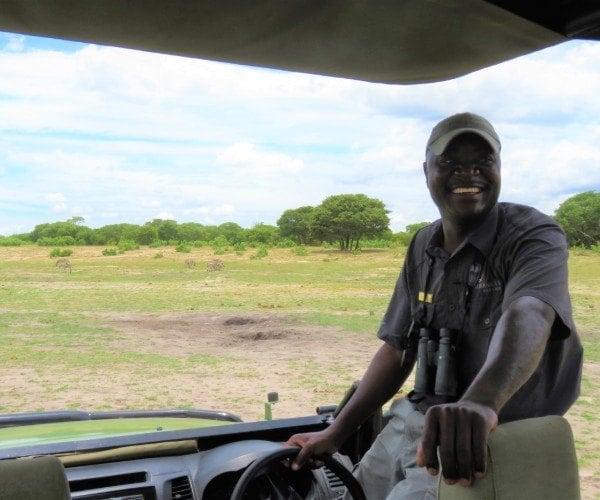 In order to become a Zimbabwe guide, students must pass a lengthy written exam covering a variety of topics related to flora and fauna. Prospective guides often study for a year before taking the test. If they pass, they go on to an apprenticeship with companies such as Wilderness Safaris (with whom my company partners). They will spend three years as a trainee under the tutelage of a professional walking guide. In addition, trainees must meet several milestones in order for their mentor to sign off on their training.
In order to become a Zimbabwe guide, students must pass a lengthy written exam covering a variety of topics related to flora and fauna. Prospective guides often study for a year before taking the test. If they pass, they go on to an apprenticeship with companies such as Wilderness Safaris (with whom my company partners). They will spend three years as a trainee under the tutelage of a professional walking guide. In addition, trainees must meet several milestones in order for their mentor to sign off on their training.
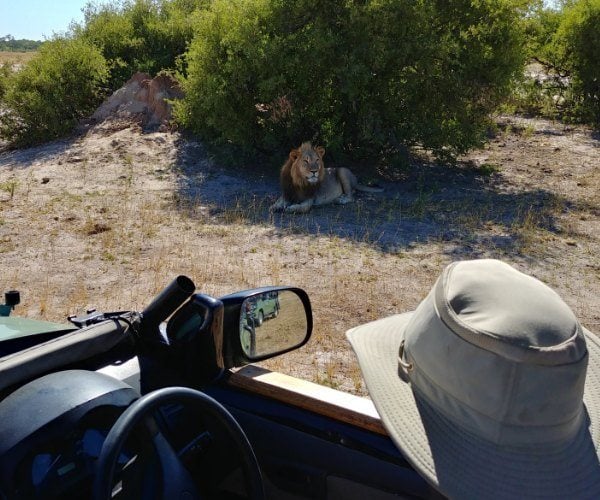 After three years of hands-on, experiential training, there’s a panel interview. Trainees are questioned on their breadth of knowledge, experience in the bush, and safety procedures. They must also display practical skills such as a firearms proficiency exam. , as well. While most guides will not be involved with hunting safaris, guides are required to carry rifles at all times on game drives and bush walks for photographic safaris.
After three years of hands-on, experiential training, there’s a panel interview. Trainees are questioned on their breadth of knowledge, experience in the bush, and safety procedures. They must also display practical skills such as a firearms proficiency exam. , as well. While most guides will not be involved with hunting safaris, guides are required to carry rifles at all times on game drives and bush walks for photographic safaris.
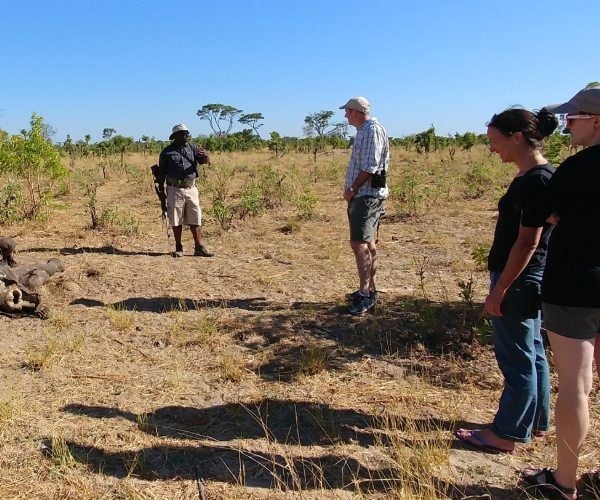 After all of that, the ultimate test is still yet to come—a seven-day “mock” safari. For this final examination, the trainee guide sets up and runs their own tented camp safari with “guests” from the national parks and guide organization. They judge on a range or criteria including hosting, safety, knowledge of wildlife and botany, and bushcraft. If the mock safari is successful, the trainee becomes a fully-licensed Zimbabwe safari guide!
After all of that, the ultimate test is still yet to come—a seven-day “mock” safari. For this final examination, the trainee guide sets up and runs their own tented camp safari with “guests” from the national parks and guide organization. They judge on a range or criteria including hosting, safety, knowledge of wildlife and botany, and bushcraft. If the mock safari is successful, the trainee becomes a fully-licensed Zimbabwe safari guide!
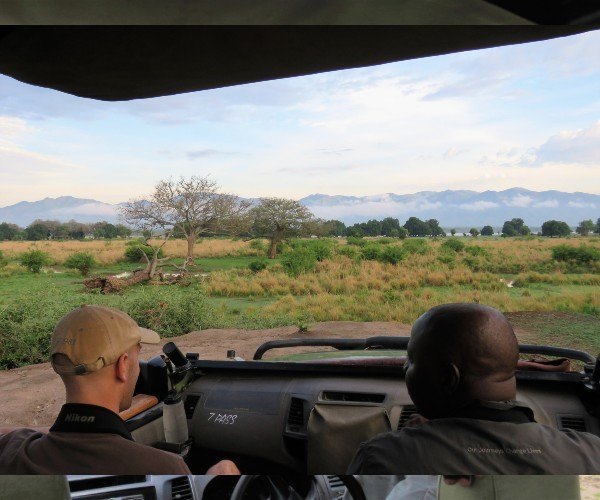 Keep in mind, that although a guide may be trained by the book, there is a lot more to being a great guide. High-end camps and lodges also require certain personality traits, such as having a guest-centric attitude, patience, and an innate understanding for dangerous animal behavior. Being a people person is incredibly important, as is having an appreciation for lighting and vehicle positioning for photography. As a guest, you may not even realize the thought that goes into details like that. It’s also vital for guides to be good storytellers. During game drives and at sundowners, guides will regale guests with stories about funny animals, incredible moments, and their own background. A vivid and animated storyteller is much more memorable and entertaining than a dull one!
Keep in mind, that although a guide may be trained by the book, there is a lot more to being a great guide. High-end camps and lodges also require certain personality traits, such as having a guest-centric attitude, patience, and an innate understanding for dangerous animal behavior. Being a people person is incredibly important, as is having an appreciation for lighting and vehicle positioning for photography. As a guest, you may not even realize the thought that goes into details like that. It’s also vital for guides to be good storytellers. During game drives and at sundowners, guides will regale guests with stories about funny animals, incredible moments, and their own background. A vivid and animated storyteller is much more memorable and entertaining than a dull one!
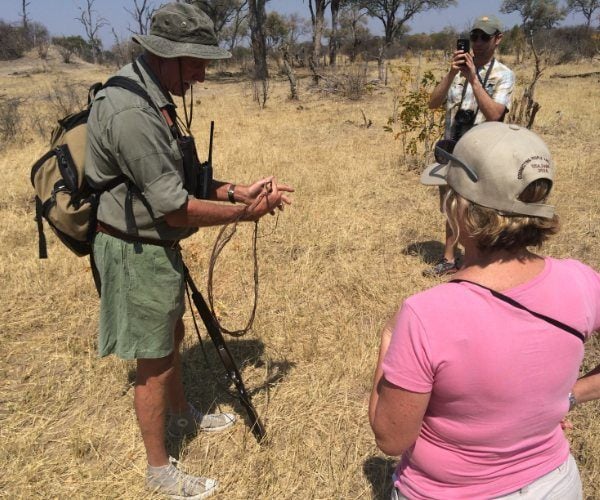 Matt Holmes is the Founder & President of Boundless Journeys. Boundless Journeys is an award-winning tour operator that goes off the beaten path for immersive and authentic travel experiences.
If you would like to be a guest blogger on A Luxury Travel Blog in order to raise your profile, please contact us.
Matt Holmes is the Founder & President of Boundless Journeys. Boundless Journeys is an award-winning tour operator that goes off the beaten path for immersive and authentic travel experiences.
If you would like to be a guest blogger on A Luxury Travel Blog in order to raise your profile, please contact us.Did you enjoy this article?
Receive similar content direct to your inbox.


An absolutely fascinating idea for a post. Interesting to go behind the scenes and find out how the guides get to where they are. I’ll never take a safari guide for granted again.
Thank you! We like to provide a bit more background information to give people a better understanding of the experience they can expect.
Do you think that it’s likely that other countries in Africa will take the Zimbabwean Pro Guide style of training as their model?
It seems to me that safaris are an incredibly competitive business. Especially with everyone wanting to move up market into the lucrative high end. I would expect that guide standards are only going to improve.
It sounds like from another comment that other countries are slowly starting to adopt some of the Zimbabwe training processes. Aside from passing the certification, the higher-end safari outfitters and camps employ the most experienced and best guides. But there is a market for budget safaris, as not everyone can afford $1,000 per person, per day. It’s just important to be aware that a budget safari will have a less experienced, and probably younger guide, but they have still passed the necessary exams.
It’s reassuring to know the guides are so thoroughly prepared for the job with learning, exams and years of hands on experience. They’re certainly put through their paces. I knew that they’d have to have some kind of experience before qualifying but I didn’t know it involved quite so much. And then, as you say, there are the personality aspects for interacting with the visitors, not just the practical bits to do with the safari and animals. Really interesting stuff, makes me feel safer knowing I’d be in good hands!
As long as you are traveling with a reputable safari outfitter, guides will be licensed and trained accordingly. However, keep in mind that you get what you pay for, so a safari on a shoestring budget will not be led by the best, most experienced guides. Those guides work for the higher-end companies as they have worked their way up and been promoted for their skills.
I’ve never done a safari in Zimbabwe but when I’ve done safaris in other countries I’ve been astounded by the skills of the guides. It seems to me that they hear or see the rustle of a leaf about half a mile away and will then spot the creature that caused it. All the guides that I have been with are tuned into their environment in a way that I never thought possible. They are the guys who make your safari.
You summed it up beautifully!
If you get a guide who has been round the clock a few times he will have a treasure trove of stories. Some of them quite hair-raising and you’ll be hoping that you don’t get any incidents like those on your safari.
Animals are, afterall, still very wild creatures, and while extensive training can absolutely prepare guides for most situations, the wildlife can still be unpredictable. But the rewards of safaris far outweigh the risks.
I’m sure that some documentary maker or TV executive is going to read this and think, “Wow, there’s a great documentary here on training safari guides.”
Let’s face it if you can make a documentary series out of training air hostesses in Gatwick, Luton and wherever, how good would the drama of the safari, set in Zimbabwe, be?
That would be awesome!
Absolutely the Zimbabwe guide have set the banner for other countries to model. We are always grateful for the Zimbabwe training which several countries are slowly adopting.
That’s great to know that other countries are following suit.
Very interesting and reassuring aswell to know that Safari guides undergo all this training
Really one needs to be very passionate about this job to do all that
Passion is an absolute requirement! :)